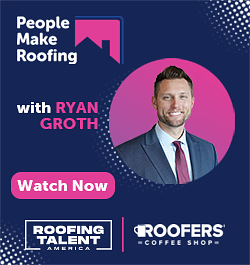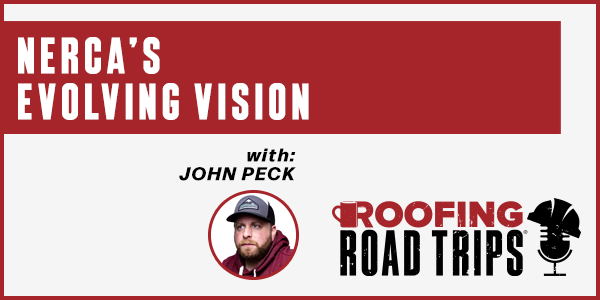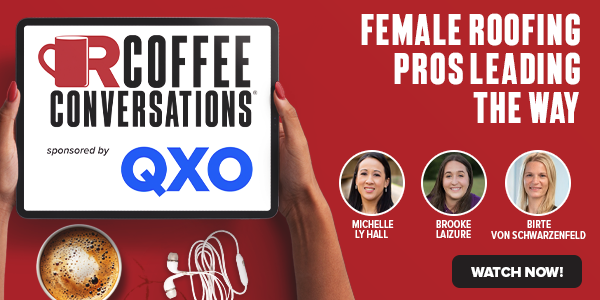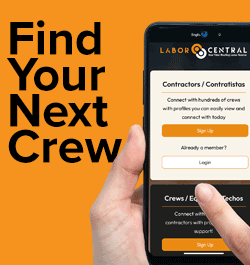People Make Roofing: Ryan Groth - PODCAST TRANSCRIPT
May 9, 2025 at 6:00 p.m.Editor's note: The following is the transcript of a live interview with Ryan Groth, founder and CEO of Sales Transformation Group. You can read the interview below, listen to the podcast or watch the recording.
Intro: Welcome to People Make Roofing, a call to action led by McCormack Partners and RoofersCoffeeShop. We're tackling the industry's biggest challenges, from outdated misconceptions to the widening skills gap. Our mission? To show the next generation the true potential of roofing, including the diverse opportunities, endless growth possibilities and a chance to make a lasting impact. Join us as we share unfiltered stories from industry professionals across North America, inspiring and guiding the future of roofing. This is People Make Roofing.
Luke McCormack: Hello, guys. This is People Make Roofing. I am your cohost, Luke McCormack, founder and CEO at Roofing Talent America.
Heidi Ellsworth: And I am the other cohost, Heidi Ellsworth, president of RoofersCoffeeShop.
Luke McCormack: And today, we are very happy to bring you our guest, Ryan Groth. Now, Ryan, this is a special one for me, because when I first joined the American roofing industry, you were one of the first people that I spoke to and you're now the first guest after we've rebranded to Roofing Talent America. So I've been super excited to get you here, Ryan. So welcome. And why don't you give yourself an introduction for the people who don't know you?
Ryan Groth: Yeah. Thanks, Luke and Heidi. Good to see you. Good to be with you and congrats on the rebrand. It looks really great.
Luke McCormack: Appreciate it. Thank you.
Ryan Groth: Yeah. So I'm Ryan Groth and I'm the founder of Sales Transformation Group. We go by STG quite often and we help contractor teams sell more. That's really it. We help them sell more, sell better and it impacts a lot of good things when selling is working. And so, that's, in a nutshell, what we do.
Luke McCormack: Brilliant. So I remember the first time that I met you, Ryan and I was looking at your background and I was like, "Wow." It's so different from most people that I see in roofing and I love to see that. I love to see people from outwith the industry having a change of career path and joining and you were a superstar ballplayer. So what's the story, Ryan? How did you get started and get into roofing and get to where you are today?
Ryan Groth: Yeah. Love the question. And yeah, it was an unconventional path for sure. I had some construction family history with my mom and stepdad's business. Aside from that, I didn't have any business vision, but I always had big dreams and goals and that showed itself through baseball for me. So I did play collegiate and professional baseball. I was drafted a couple of times, once by the Pirates and once by the Angels. And just becoming a professional athlete formed me into who I am.
It's not all of who I am. There's other parts of me that it's my identity, but man, being a hard worker, doing hard things, going the extra mile, doing things that no one else would do, putting time in the gym, competing at a high level, traveling, all the sacrifice, all the things that I did to get to that level, which wasn't even like All-Star, Major League, millionaire level, obviously or else I maybe wouldn't be doing this.
But I got to a point where it formed in me something that was transformational for me. I went out, maybe a broken family, some challenging upbringing to professional athlete, confident, can go out and do things. And by the time I was 25 years old and my wife and I are getting married and we're about to have a kid, I knew I had what it took to figure stuff out, but I didn't know what it would look like until I started to meet certain people in the roofing industry.
And that's really where my career started to go off like a rocket ship from day one when I had the right people around me. So I'm basically, imagine a former professional athlete, family guy, driven as heck, ready to take on the world and do whatever it takes and I'm just looking for home and I hadn't found it. So a friend of mine was like, "Bro, why don't you get into sales? You're a competitor. You're a communicator. If I met you with one of my other companies, I'd hire you in a heartbeat."
And I was like, "Huh, I've never heard anybody that I know and respect say that to me before." And I just started to realize, "Hold on." Once I started getting into sales, like, "This is like a sport. Everything that I did and who I became to get to the level I got to as athletics, I can do that to make money? It's almost easy, like a cheat code. Let's do it."
So I felt inspired to take action. And when I saw roofing, I was introduced and I got to be a part of a large organization in South Florida. They just sold to a private equity group, a small boutique firm. I think they're doing around 80 million a year in commercial roofing and one of the most respected brands and CEOs probably in our last generation and I got to sit under him for four-and-a-half years and probably get 30% of his time.
I mean, I was grabbing his shirt every second. We were running and gunning and he taught me the game. He taught me the game of business in roofing. And as I was actually part of something beyond the roofing business, I got to take a CRM tool he built for himself out into the industry. And it wasn't just, "Hey, here's an awesome technology. Here's where we're going." It was, "Hey, here's how to be better at growing your sales team. Here's how to manage your pipeline. Here's how to set goals. Here's how you should go about your sales process. Here's how you should lead with service and here's how you grow your brand. Here's how you should set up your org chart. Here's how you should assess your team. Here's how you should coach them."
And I was just doing that for four-and-a-half years to supplement the CRM usage to gain adoption. Well, what I didn't realize was what was being incubated was a sales trainer that was going to go out into the industry. I had no idea. I was just trying to be the best I could to bring value. And Heidi remembers me in those days. And then whenever him and I ended, I wasn't even expecting it. I thought I was going to run forever with the guy. It just turned out that we ended up parting ways and I started STG seven years ago now.
I was in such a tight corporate environment with him, which I love him. I let my hair out, down for real. I grew it down to here for two years because I was like, "So, oh, I'm on my own. Hey, let's go." And it was awesome. So I basically, from there, just did the same thing I did. Instead of without a CRM tool I was using, I was doing it more with sales processes, coaching in my time and I would just go and light a team on fire and get them going and just tell them what they need to do and coach them.
And then, yeah, that was it. And I'm not really an extraordinary, the TPO and PVC. I know the products, but I'm caring less about that. I know there's other people that can do that. I care about people and the business and the leadership and the culture they're creating. And if we can make that incredible, everything else will figure itself out. That's a fact. So that's really where I saw the opportunity and started running and found my home here.
Heidi Ellsworth: I love that story. And the thing I really love, Ryan, is that I got to be a part of it and watch it, because you had just done such great things and there's just finding a need and seeing that need and filling it that is so important. And this next question, I'm not even sure if I should ask you, because I think you just told us the answer, but I would love you to go a little bit more on that. But what is the most rewarding about what you're doing right now and where you've come to?
Ryan Groth: Yeah. Very rewarding part of the business is a company wants to grow. Maybe they're at 4 million. They want to get to 10 or maybe they've been stuck at 15. They want to get to 30 one day. And what's really the problem, like the constraint in their business, is they get caught in this reactive sales culture and then the prospect kind of steering every conversation and then they become more like a bidding company. They're just quoting. They're just estimating.
And what's very rewarding is, when I see them go from that to what we like to call the graciously assertive alpha dog, is one of our ways we describe salespeople, be the graciously assertive alpha dog and if we do that and we start to control the process and we have things we want and need to accomplish to help the prospect, who doesn't necessarily know what they don't know and when these sales reps and these sales leaders are trained on this thought process and they understand how to go through a sales process that's professional, that supports everybody's needs and they start closing more deals and making more margin and having bigger deal sizes, the owner is like, "Oh my gosh, the sales team's setting me free, because they know what to do. Now they can grow the business in other ways."
One of my favorite things is when I see the professional sales manager hired at a roofing company. It's like, "Wait. You're no longer just you and your two people or just you and the one guy, your brother. No, you have a sales manager and a professional sales team out there representing your brand with a culture, with a process, with numbers, forecasting, technology, hitting those numbers."
And I love seeing a company go from where they are, maybe middle level, committed, not super buttoned-up, to a professional sales team representing a commercial or residential roofing company. I'm like, "Whoa, this is impacting their business and their bottom line. It's really cool." And then if someone sells, which in the last few years has been the thing, I know we've had a part of that. It's really cool. So yeah, it's very rewarding.
Luke McCormack: It's amazing, Ryan. And I love what you said at the start, the tipping point for you where you actually realized that there was an opportunity here for you in roofing and it was someone from within the roofing industry that's helped you. And I know that we've got a lot of the same friends, a lot of the same connections and I wouldn't be where I am in the American roofing industry if it wasn't for the people that make roofing.
But how important has that been to you, the people in this industry that's gave you a leg up, that's guided, that's mentored you? And for people from the outside looking in that don't know much about roofing, it's very hard to explain to them what the people are like in this industry, but how would you describe the people that have helped you in the industry and the impact that's had on you?
Ryan Groth: Yeah. It feels weirdly like a family. I have my uncles and my fathers in the industry and then I got my brothers and my sons, lack of a better word, the young bucks that I'm kind of mentoring. It feels like a family. It's weird. It's like if I think that if you're in this industry and you don't have a bunch of egg on your face, because you're not doing some dumb stuff and you carry yourself professionally and you go about your way with integrity, you do what you say and you say what you do, that right there is 75% of it.
But then if you actually bring sizzle and salt and you bring real value that's different and you're not just trying to copy everybody and you are in it and you're in the industry and you care, then I would say it's hard to get in, so to speak. I wouldn't say that, but I could tell you that being in and then seeing somebody trying to, with all their strength, get in is... It's tough for those people if they don't have respect by their peers, if they're not recognized as an expert and if there's an inkling of integrity question or "Is that guy a little bit off or is he a little this?"
You won't get a lot of runway here. You're going to have to be buttoned-up, clean, authentic, real and you have to be there consistently, because this is like a family. They're like, "If you're coming into the mafia here, let's make sure this guy got past the test." But thankfully, it's all morally aligned. There were some amazing people here. In the circles that I surround myself with, everybody is buttoned-up and there's a standard for that and people will call you out.
I've had some people come to me just like a brother or sister and be like, "Dude, just clarifying about that." And they were just making sure we're good, because the association that we have with one another is very important. Our brand is everything. And if I'm going to go out there and poorly represent myself, you guys are like, "I don't know if we should have Ryan on the show. That's maybe not a good look."
So we all have to elevate each other and it's not about, "Oh, we got to care what everybody thinks." I think we just care about doing the right thing so much in this industry, because we've seen some poor integrity over the years, but we're just like... A generation ago, it was worse, but now it's like we're sniffing that out. And it's just there's too much access to good people now that if you leverage it right and you nurture it right, it can be very rewarding.
But this industry, I like to have uncles and some mentors that have helped pave the way and been a customer of mine and help support my cause, because I think people can see what's in your heart here. They could see it. They care. People who know me, they'll tell you, they know my heart. They know that I'm a good person. They know I want to do good things. And if someone's shady and they're off and they're selfish and they're all about them, I mean, people just in this industry, they won't ramp that up, at least the people you want in your corner.
Heidi Ellsworth: You just said something too, Ryan, that really hit and that is, a couple decades ago, maybe not even that long, but roofing did not have that great of a reputation and I mean over the last 10 years. And definitely, Luke's seen it internationally. But in the U.S., we have seen such a turnaround in just the pride and respect of roofing and who we are.
What is some of your advice to the younger generation coming up who maybe... We're in it every day. We talk about it. We love this industry and everything. But outside of our industry, people may not know all the great changes, everything that's happening. What's some of your advice to the younger generation to get involved in roofing?
Ryan Groth: Yeah. So I'll say that roofing is a great opportunity. It's an industry that's never going away. You're thinking about job security and you're like, "I'm going to go be a nurse," or "I'm going to go be in medical." And you're like, "Great. Why?" Because you know there's always going to be a job. Well, let me tell you, roofing companies always have a job, because the roofs need to be repaired, replaced and built from scratch all the time.
And as long as people want to build stuff and we're growing as a nation and as a world, we're going to need roofs. So I think that there's job security, for one. The second thing is that over the last several years, the business acumen is improved and access to technology has improved. So it's not quite the industry of technology or whatever it may be. There's not quite the advancements yet, but it's coming up and it's catching up to a point where it's world-class.
And out of that, people, not only have they made incredible money. Owners and their teams have made incredible money, which is important. There's also opportunity to give back and help elevate the industry. And then if you even want to be innovative and create some new advancements in this industry, there's room for that too. So if you like to be a changemaker and create value and make money and do something that's good, you do it right.
The other good thing is, if you have integrity and you have business acumen and you show up, you're going to be in the top 10%. I'm not saying it's that easy. It's getting harder, but the opportunity is there to be successful and it's very rewarding. And the people, if you surround yourself with the right networks, they'll help accelerate that path for you. They shave years and millions off of your learning tab and then years off of your ramp-up. It's very rewarding.
I mean, I don't know about you. It's like, it changes, but it's not going anywhere. It's a good place to call home and you get to work outside. You get to deal with people and you get to use technology. I mean, anybody who has any desire to do cool stuff professionally has an opportunity in roofing. The sky is the limit for anybody here.
Luke McCormack: Yeah. You're so right, Ryan. I am really interested about the sales training business that you have. Obviously, I cut my teeth in the UK and this doesn't exist in the UK. There isn't a sales training company that works specifically in roofing and I know there's a lot of service providers in the American roofing industry that are roofing-specific that do things particularly for roofing.
I'm keen to hear how is that adopted by the market, because I don't really know of anyone else that does it specifically in roofing, Ryan. So was there certain companies that were early adopters? Was there other people that you had to sort of convince? How receptive has the market been to sales training? Because the reason that I ask is, very often, we've got a roofer who becomes a businessman and delegating and bringing in outside help isn't always their first protocol.
But then we've got others who they'll take all the help they can get. They'll outsource everything. They'll try new things. Yeah. I mean, how receptive was the market when you brought it in? And to companies now who maybe don't use you guys for sales training, what would your message be to them?
Ryan Groth: Yeah. So I don't think very many people are looking up roofing sales training on the internet. They're not googling that keyword and finding us. We're not exactly saying, "We're not doing things that everybody knows is in high demand. We have to create pain and convince people." But I like to use slightly different words. And instead of saying it that way, I'll use something like... And this would be the message that I would say to anybody.
It's like, "Okay. If you, as an owner, are having to carry a lot of the weight to grow your business and sell, then you have a high-paying job. As a business owner, that's really risky. You don't have a business. Until you have a leadership team and departments and you can run a business without having to be in it and you focus on your superpower, then you have a business."
And in order for you to do that, you have to have revenue. And in order for you to have revenue, you have to make it repeatable and you have to have the right people doing the right things consistently in order to not be on this revenue roller coaster that many people will have, because you go sell a bunch of work and then what do you do when you do that? You got to go do the work. So you stop selling and now you're doing. And then when you're done doing the work, "Let's go get some work."
And so, if you don't have a big pipeline, you may just lower your price and then you're stuck and then you have less margin than you want. It puts more pressure on your crews and you don't want to hire anybody else because you don't have a guaranteed backlog of work. So you're kind of in this fog, like, "Wow, no wonder I'm not growing. It's because I don't have my foot on the gas with sales. I need to do that all the time and make it a problem on production. We'll fix that later, but we have to create a constraint in production by making sales a big deal."
And if you don't do that, you're not going to just naturally magically grow. You may have some storm that hits and stuff falls in your lap, but it's never on purpose with a plan. You're just randomly winning. I want you to win on purpose and make it through tough times. And when other people aren't doing this hard stuff, you are.
So what that looks like is you need a sales process and you need a sales training process to get other people on and it's better if they don't know anything. It's better if they don't know anything, but this is the first thing they learn and they don't have any bad habits and they fit your culture and you have a vision and they're driving with you and you're building something great, because at the end of the day, people like being on winning teams and I don't know very many winning teams without a head coach and an owner who doesn't have a plan, who doesn't want to win a championship, doesn't have goals or doesn't have a roster they want to build, doesn't know how to be a great organization.
You, as an owner, need to be a businessperson that happens to be good at roofing or do roofing and you need to make sales something that you are not going to skip on. Make sure it's awesome. Make sure it's buttoned-up. Make sure you have the right people in the right seats. When you do that and you're strategic, you can have consistent, predictable growth.
And I don't know about you, but getting to 10 million isn't as easy as people make it seem. Getting to 20 is not, getting to 30, but then growing year over year predictably, profitably and having a big EBITDA is not easy. This is absolutely hard. And if you don't think sales training and upskilling your salespeople and having a great sales organization is important, I don't know how you're going to do it. I just don't know.
Luke McCormack: Good answer. Good answer, Ryan. So with that side of it put to the side, when we look into the future of the industry, we look at the skill shortage, the generation gap, workers due to retire and the demand for people in the roofing industry has gone up. The demand for roofing services has gone up, but the amount of new people coming into the industry is going down and it's pretty scary stats. We've got 49.2% of American roofing contract and business owners are due to retire in 2029.
Now, that brings a different opportunity for our lots of young owners coming up, but we've also got 30% of the workforce due to retire and we've got more roofing companies. We've got private equity pumping more money into being more competitive. So it really is the perfect storm and I feel like right now, we're sitting on a ticking time bomb. We need to get more people into the industry.
So who this content is for, Ryan, is school-leavers, college leavers, teachers, parents, career guidance counselors. And if someone in one of those positions were listening to this right now, what would you say to them about how to get into this industry and the impact it can have on their life?
Ryan Groth: Well, if you're hungry and you have some intelligence and you want to do things right, you can grow within the right organization in this industry. You can grow and you can have success. I could tell you that being on the labor side in my early years, I could tell you, all the guys that you're on the crew with, if they find out and they hear that you're running out of work, then they're looking somewhere else.
So as long as they're being fed and they have work and they're being paid and they have an idea of where they're going to grow potentially, you can attract people. And so, what does that mean? That means you have to be putting jobs on the board. You got to sell. You got to grow your company. You can message this to the industry in your local area to get people come on.
And if you're being recruited into a roofing company, I just want you to know, if you're smart, you work hard, you do what you say you're going to do, you can grow maybe even out of the field potentially, into the office, into something else if you wanted to. I'm not saying you should. Production is amazing, but there's great opportunity here and the sky is the limit. I said that earlier. The sky is the limit for somebody who wants to do great things and technology. There's so much opportunity.
I mean, if you're hearing this and you're thinking, "Okay. Where should I go that's going to help me grow?" that's always going to be there. That's not just going to close up in this industry that has great people in it, that has opportunities for me to learn more. If there's a good business in my market that wants to help people grow like that, I know if I work for them, I'll prove myself and we'll do great things.
And if not, there'll be a better chapter somewhere else. "What industry should I choose?" It's like, "Huh." It's like, "Roofing has all that. It has all of it." Thinking about shingles and TPO isn't the sexiest thing. It's not like you're going to lululemon, but dude, lululemon people make no money. Do you want to make real money? Go do something that's really useful at a high value in this industry and your market, which roofing is one of those things.
Yeah. It's a great industry. I'm so grateful. It kind of pulled me in and allowed me to cut my teeth and allowed me to make some messes and find my home and it allowed me to be here, because it's feeding my family and it's helping feed families on my team and it's helping salespeople feed their families, which feeds the families of the crew.
So just all of it, just a trickle-down effect and being good at something and finding your niche, but there's a home for you here. But I would encourage you to come somewhere and learn and put down roots and have a place to jump from. I'm so glad I spent four-and-a-half years down in that company in Fort Lauderdale. That was a long time. I mean, that's like a full undergrad, a full undergrad or whatever. I spent a lot of time there and it was perfect for me. And I think if I would've jumped out too soon, it may had been too soon. So go find a home and go learn.
Heidi Ellsworth: Ryan, I love what you're saying, because one of the things that I think about is, there's really so many different places within the industry for whatever you want to do. If you love working with your hands, being outside, that construction, I mean, we have had some great podcasts talking to people who are just like, "Me and my hammer, man. That's what I love. I love being up on the roof," or if you want to be in manufacturing or distribution, I mean, there are so many ways to enter this industry.
But to your point, once you do, you find your home and you really don't leave. What do you see as kind of the future of the roofing industry? I mean, like you and I or all three of us were talking about, so much has changed over the last 30 years. What is the future of the industry and what can young people look forward to looking ahead?
Ryan Groth: I would say that I started in the commercial industry and then I started to expand out in the residential and learn the insurance side. I think the future is that there's going to be more of a retail business, which means you have to have a local brand and you got to market and you have to have a local presence and it won't be so easy to get a roof. You have to either come out of pocket pretty significantly to pay cash or finance it, which I think it does a lot. It levels the playing field of professionalism. So I think that's one.
I think with private equity coming in, they're going to... All the different platforms set different strategies, but I think you're going to see smarter people coming in, which means that there's going to be people on ads saying, "We're hiring a CMO of a roofing company." Those days are coming and you're like, "Wait, what?" "A CMO, a chief marketing officer." "What?" "No, this is not a $4 million company. This is a $400 million-a-year company. This is a $400 million-a-year company and we want to get to $1 billion in 18 months."
That's the kind of stuff that's happening. So where I'm going with this is, there's going to be space for more sophisticated org structures in roofing companies, not just manufacturing... Roofing companies. And what that means is, it means a lot. There's a big implication on that. It means that if you have skills and you're a professional, you have a track record, you're going to find a great career.
And then if you're great on social media, drones, estimating, you like video games, maybe you should be an estimator, because you can crunch numbers and do stuff on a computer. If you like people and you like making it rain and you want to go bag the big game and bring it to the table for everybody to see and give you a hand clap, maybe you should be in sales. You should go do that.
There's space in this industry where, literally, if you're talented 10 years ago, you come into a company, all of a sudden, you do everything, like, "Oh, yeah. I can do this. I can do this." It's like, "Whoa, this is..." And then they're buried. They're like, "Oh my gosh." And then the people who are like those unicorns who are just psycho and going to do whatever it takes, they end up either owning their own company or being the number two and it works out.
Those days in 10 years will be a little different. It's going to be more structured, more professional and it won't be the Wild, Wild West. It's not even like that anymore. 10 years ago, it was. 20, it definitely was. It's not like that now. And soon enough, it's going to be buttoned-up. So come in and let's have a great career, is kind of the way I see it.
Luke McCormack: Amazing. Amazing. Amazing responses, Ryan. That's great. You really feel your passion coming through with the industry and the industry has given you so much and it's very good that you get to join us today and give back to the industry. So thank you for that, Ryan. For the audience watching, Ryan, how can people connect with you?
Ryan Groth: Yeah. Just find me on Instagram, LinkedIn or Facebook if you want to find me personally. And then, yeah, if you want to email me, just email me at Ryan... Actually, don't email me. Go to my website. Go to my website, sellonstg.com. Just go to sellonstg.com. Yeah. Just go there and you can find our information.
And we'd love to chat with you if you have some challenges with sales and your business is like an up-and-down roller coaster and you're just not breaking through and you're like, "We need a breakthrough. Our sales guys stink," or "Our sales leaders don't know what they're doing. We're just stuck." So if that's you, let us know. We have tools, training, coaching for you, workshops for you, things that can just get you fired up and ready to go take action and grow your business. So go check us out.
Heidi Ellsworth: I love it. Ryan, as always, thank you so much and congratulations on a great business and just great success. For everyone out there, you can find this on People Make Roofing podcast on RoofersCoffeeShop and also, you can engage and comment on Luke McCormack's LinkedIn and also on Roofing Talent America LinkedIn and RoofersCoffeeShop LinkedIn. So you can find us almost everywhere and to check out all of our People Make Roofing podcast as we try to tell the story and celebrate this great industry of roofing.
Luke McCormack: And if you or anyone else that you know has a great story that you want to share them, please reach out to Heidi, myself. We would love to shine a light on you and be the vehicle to share your story with school, college, university leavers. So yeah, please reach out. And until next time, thank you.
Heidi Ellsworth: We'll see you next time. Thanks. Have a great day.
Outro: Thanks for listening to People Make Roofing. Together with McCormack Partners and RoofersCoffeeShop, we hope to shape the future of our industry. Share this episode and keep the conversation going, because people truly make roofing. Find more at rooferscoffeeshop.com.























Comments
Leave a Reply
Have an account? Login to leave a comment!
Sign In